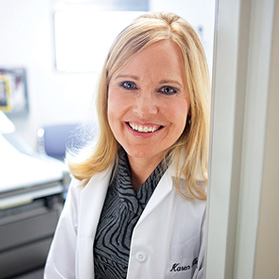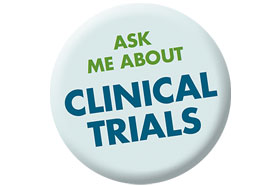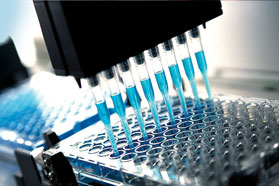Focus on finding a cure
 "Clinical trials are enormously important, and the more that we can offer, the better. Conducting clinical trials is the only way we will cure cancer."
"Clinical trials are enormously important, and the more that we can offer, the better. Conducting clinical trials is the only way we will cure cancer."
"Clinical trials are enormously important, and the more that we can offer, the better," Kelly said in an interview just one month after she arrived at UC Davis Cancer Center. "Conducting clinical trials is the only way we will cure cancer."
Kelly is an internationally recognized lung cancer expert at the forefront of evaluating anticancer agents, primarily for small-cell and non-small-cell lung cancer. Before coming to UC Davis, she served as deputy director of the University of Kansas Cancer Center, where she built an infrastructure that revitalized their clinical trials program to better serve patients and streamline the process for physicians.

"We are extremely excited about bringing Karen Kelly to UC Davis Cancer Center," says Ralph deVere White, associate dean for cancer programs at UC Davis School of Medicine and cancer center director. "She is a seasoned investigator who more than doubled patient accrual to clinical trials in just three years at the University of Kansas Cancer Center. She is also an outstanding clinician as well as mentor to physician-scientists."
According to Kelly, Phase I studies can be the most challenging among clinical trials. Phase I trials are designed to determine the most effective dose and to evaluate a drug’s safety; often a Phase I drug is being used in humans for the first time. (Phase II trials help determine whether the drug actually helps fight a disease, and in Phase III trials, the new drug is tested against the current standard therapy.)
 "Patients understand that they are contributing to science. Curing cancer is about an entire team of absolutely critical components – scientists, physicians and patients. But most importantly, clinical trials offer hope."
"Patients understand that they are contributing to science. Curing cancer is about an entire team of absolutely critical components – scientists, physicians and patients. But most importantly, clinical trials offer hope."
Although Phase I trials typically involve as few as three patients, they are extremely costly. Subjects must be monitored very closely in a clinical setting by an expert team of scientists, physicians, pharmacists and nurses, who regularly evaluate patients for changes in their blood chemistry and other target tissues.
Kelly says that her top priority in her new job is to enhance access for patients to many more leading-edge drugs. She hopes to make the process of getting promising new agents – many being developed at UC Davis – to clinical trials more efficient. She also aims to build partnerships with small biotechnology companies that need an academic medical center and large patient base to test new compounds.
UC Davis Medical Center holds a National Cancer Institute grant for Phase I clinical trials, which Kelly acknowledges is a privilege given to only a few institutions in the country.
"We already have a stellar program here, and I just hope to enhance and expand it," she says. "I have been so impressed with everyone’s willingness to work together collaboratively – at the end of the day that is the most important ingredient for success."
Kelly also intends to design curriculum in Phase I clinical trials development to be offered as a subspecialty of the existing hematology-oncology fellowship program. Not many institutions have such a program, she says, and more are desperately needed to increase the nation’s capacity to test new therapies.
In addition to her responsibilities at the Cancer Center, Kelly serves on numerous national committees: as chair of the board of directors for the International Association for the Study of Lung Cancer (IASLC), as a member of the board of scientific counselors for the National Cancer Institute, and on several program committees for the World Conference on Lung Cancer. She has been the medical oncology track leader for the Lung Cancer Committee in the Southwest Oncology Group since 2002. She also has authored or contributed to more than 150 papers, reviews and book chapters, and frequently lectures on lung cancer topics at conferences worldwide.
 Kelly says that her top priority in her new job is to enhance access for patients to many more leading-edge drugs. She hopes to make the process of getting promising new agents – many being developed at UC Davis – to clinical trials more efficient.
Kelly says that her top priority in her new job is to enhance access for patients to many more leading-edge drugs. She hopes to make the process of getting promising new agents – many being developed at UC Davis – to clinical trials more efficient.
"Karen is a top-notch lung cancer researcher and a dynamic leader," says Joan Schiller, deputy director of Simmons Cancer Center at the University of Texas Southwestern Medical Center, who has worked with Kelly at IASLC and on several other national committees. "UC Davis is extremely lucky to have her."
Along with her administrative duties, Kelly continues to practice medicine in the oncology clinic. "My patients motivate me," Kelly says. "Lung cancer is the leading cause of cancer deaths – both in this country and worldwide. Patients desperately need more options."
How does she convince someone that it is a good idea to enter a trial that will only determine whether a drug is safe?
"Patients understand that they are contributing to science," she says. "Curing cancer is about an entire team of absolutely critical components – scientists, physicians and patients. But most importantly, clinical trials offer hope."






